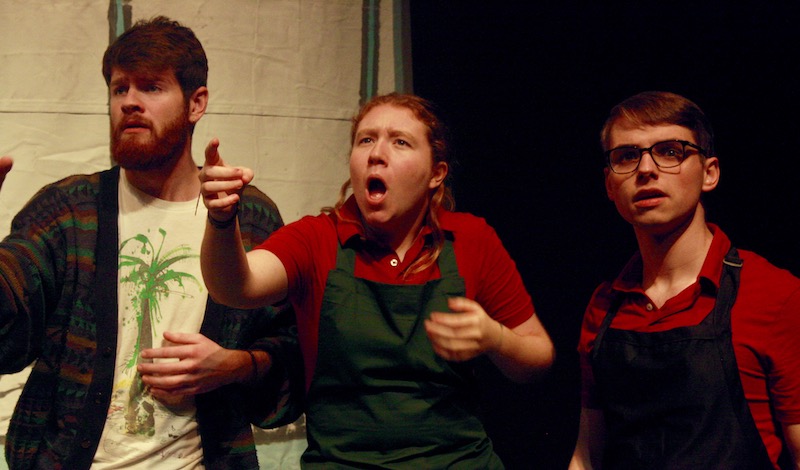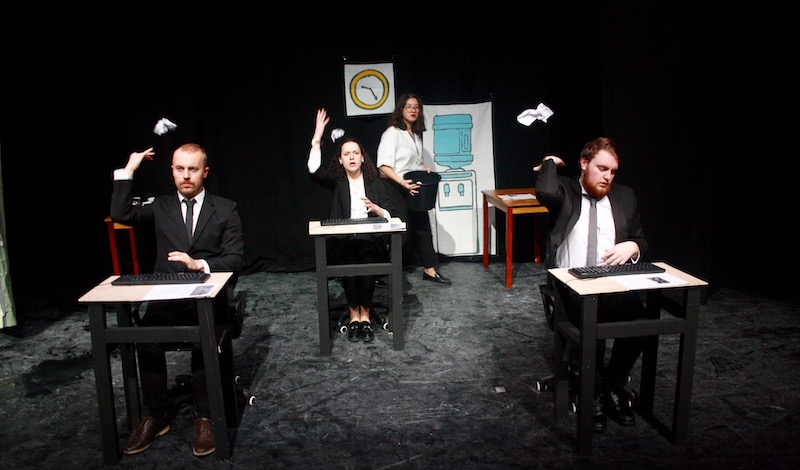Rhinoceros
★★★☆☆ Interactive
Assembly Roxy: Weds 5 – Sat 8 Dec2018
Review by Dominic Corr
Theatre Paradok’s interpretation of Eugene Ionesco’s absurdist Rhinoceros, at the Assembly Roxy all week, is a bold attempt to bring the text into a modern setting.
The play was created in response to the surge of fascist ideologies following the second world war. Where Paradok’s production offers new ideas to make theatre interactive, however, it fails to deliver in practice.

Rhinoceros sees the inhabitants of a small French village start morphing into rhinoceroses – as life begins to adjust to this sudden occurrence, one lone figure pushes to maintain his individuality against the masses.
Berenger is the epitome of the everyman, if slightly more dependant on his drink than most. As those around him transform, he starts to fear he or his beloved Daisy maybe next.
Ionesco wrote in response to fears of the other. His concern was the delusional worry that immigrants gradually infiltrate our lives, conditioning us into becoming one of them – one of that which we feared. Theatre Paradok has subverted this concept, turning it into a commentary on our obsessions with our social media and technology.
In a creatively intertextual move, Paradok offers a QR code alongside tickets for the production. Scanning this into their phones gives audience members the opportunity to communicate with the cast and fellow audience members during the play.
a hollow effort
This is an attempt to involve the crowd in the production. Instead, however, it distracts from the performers onstage. It feels like a hollow effort: there’s an idea there but it isn’t fully developed.

If the company had got its thought process right, this could have made Ionesco’s text timeless. New waves of ideology can be transferred into rhinoceroses, something Theatre Paradok attempts valiantly, though the result does not have the impact they desired.
The image we create of ourselves, primarily online, is causing those who feared the ‘other’ to in fact transform themselves into something other (rhinos). They manipulate their online selves to the point where there is no truth left in what they present.
This is best shown by Angus McHarg as Berenger and Hasancan Cifi as his friend Jean, a trim suited fellow who scolds Berenger’s drinking and lazy lifestyle and is the first to transform. His self-righteous attitude and scoffing at the rhinos make him the ideal candidate to not notice he is becoming one himself.
Berenger, who has a damaged phone, finds himself complacent and actively avoiding the Rhinoceroses, even as they acclimatise to normal life.
Happy medium
Camilla Makhmudi, as Berenger’s beloved Daisy, puts in the most grounded performance in an otherwise eccentric production. She shows that there is, somehow, a happy medium. By accepting the rhinoceroses but staying true to her identity she is unaffected.
Fake news is additionally up for debate, primarily through the terrifically performed Botard and Dudard. Sam Eastop slithers as the slippery Botard channelling all naysayers and doubters, rejecting the rhinoceros’s existence. Dudard (James Strahan) on the other hand is far more agreeable, passive in the role the rhinoceroses seem to now play in their day to day life.
Theatre Paradok is a company with ambitions, bold ones at that. Their decision to incorporate personal technology into their production is clever but ultimately gimmicky. For what they have produced, much kudos for a lengthy, humorous and, at times, clever production.
Running time: Three house (including one interval)
Assembly Roxy, 2 Roxburgh Place, EH8 9SU
Wednesday 5 – Saturday 8 December 2018
Evenings: 7.30pm.
Run ended.
Theatre Paradok Facebook: @theatreparadok.
ENDS


















